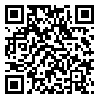Volume 1, Issue 1 (2023 2023)
JRH 2023, 1(1): 42-52 |
Back to browse issues page
Download citation:
BibTeX | RIS | EndNote | Medlars | ProCite | Reference Manager | RefWorks
Send citation to:



BibTeX | RIS | EndNote | Medlars | ProCite | Reference Manager | RefWorks
Send citation to:
Hoseini Karnami S H. Happiness and Moral Health in the Thought of Hakim Matala Allameh Ayatollah Hasan Hassanzadeh Amoli (RH). JRH 2023; 1 (1) :42-52
URL: http://jrh.mazums.ac.ir/article-1-1076-en.html
URL: http://jrh.mazums.ac.ir/article-1-1076-en.html
Associate Professor, Department of Islamic Studies, Faculty of Medicine, Mazandaran University of Medical Sciences, Sari, Iran
Abstract: (2399 Views)
Happiness means "theoretical and practical knowledge and recognition of the truth and action in accordance with it" and "benefiting from material and spiritual gifts and pleasures in this world and the hereafter" and is one of the fundamental and central concepts in the science of ethics and the moral system of Islam, which has been used for a long time. It has been the discussion and concern of philosophers, scholars of ethics, and mysticism. The current research is based on the analytical-documentary method and uses the 53 titles of Allameh's books and his treatises, and has analyzed the topic of "happiness". The findings of this research show that humans have taken different paths in learning happiness and its objective learning. Allameh Hassanzadeh Amoli, while approving the intellectual approach and practical behavior of the first category, introduced the only way to achieve happiness as following the Sharia and applying the divine rules and regulations. He has also claimed that the way to attain human happiness is in these elements: meditation, walking the steps of the path, and the spiritual movement of Relinquishment, Adornment, Shining, and Annulment as the degrees of spiritual wayfaring, approaching and resembling the Absolute Beauty and Perfection, education and discipline, sperm element, instructor, gathering, association, and good deed, he emphasized the principle of meditation and considered it the seed of happiness.
Type of Study: Content analysis |
Subject:
Islami Sciences & Thoughts
| Rights and permissions | |
 |
This work is licensed under a Creative Commons Attribution-NonCommercial 4.0 International License. |





